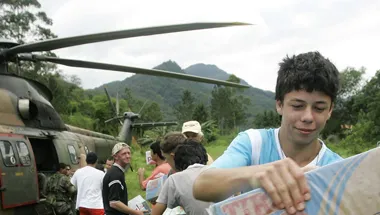
Biography
Dr Thomas Fröhlich is a political scientist who is interested in “how things get done” in international politics. His work focuses on the geopolitical implications of the global energy transition.
Thomas holds a Master's degree in Political Science, European Law and Latin American Studies from the University of Munich. He completed his PhD at the KCL Brazil Institute on the topic of Brazil’s ethanol diplomacy under Presidents Lula and Dilma. Within this context he applied a neoclassical realist framework to Brazil’s foreign policy making and integrated soft power in this analysis.
Prior to starting his doctoral studies, he worked as a political consultant in Berlin and kept doing so on a freelance basis throughout the PhD. Thomas continues this work to support political campaigns and to bring academic evidence into the political discussion.
Research Interests
- Geopolitics of climate change mitigation,
- Energy security and access to strategic commodities in the context of the European Green Deal,
- Foreign policy and regional integration in Latin America,
- Political risk analysis and strategic foresight,
- Soft Power and diplomacy,
- Neoclassical Realism in International Relations theory
Thomas’ research analyzes different types of power and how they fit into International Relations theory. This ranges from soft power on a more conceptual level to security of strategic commodities in pragmatic terms. One of the aims of his research is to inform policy making about risks, in particular in the context of global decarbonization efforts. His regional expertise lies in the European Union and Latin America.
Publications
- Froehlich, T. (forthcoming). Brazil’s International Ethanol Strategy. London: Anthem Press. [manuscript accepted]
- Froehlich, T. (2020). Review of Ohnesorge (2020): Soft Power. In: Sicherheit & Frieden (38) 2-2020 pp.120-121. https://doi.org/10.5771/0175-274X-2020-2-119
- Froehlich, T. (2020). Brazil’s “Ciencia sêm Fronteiras” Program and Soft Power. Brasiliana: Journal for Brazilian Studies, 9(1), 496-520. https://doi.org/10.25160/bjbs.v9i1.120096.
- Froehlich, T. (2018). Why did Brazil’s ethanol diplomacy fail? In: FGV Boletím de Conjuntura Energética Nov 2018 p. 9.
- Froehlich, T. (2017). The State of the Hydrogen Economy. In: EUCERS Newsletter #68, October 2017.
- Froehlich, T. (2017). Brazil's ethanol experience and the way forward. In: Brazil Business Brief. May 2017.
- Froehlich, T. (2014). The Future of NATO: More Than Just Collective Security. Blog article for German Marshall Fund of the US.
Research

Environmental Security research group
The Environmental Security research group brings together scholars from the security community and scholars working on issues of environmental security.

Environment, Energy & Sustainability
This research group focuses on Brazil’s contributions to global environmental and energy policies.
News
Facing up to the global energy crisis
The war in Ukraine has laid bare how energy resources are intertwined with political power and international security, plus how reliant we still are on fossil...

Research

Environmental Security research group
The Environmental Security research group brings together scholars from the security community and scholars working on issues of environmental security.

Environment, Energy & Sustainability
This research group focuses on Brazil’s contributions to global environmental and energy policies.
News
Facing up to the global energy crisis
The war in Ukraine has laid bare how energy resources are intertwined with political power and international security, plus how reliant we still are on fossil...

